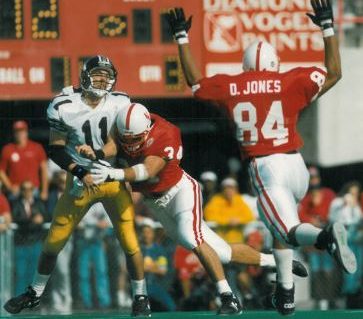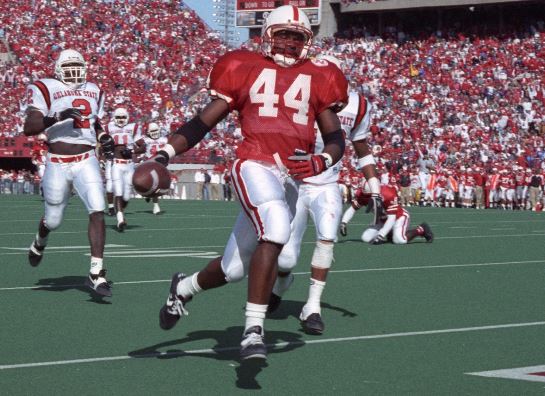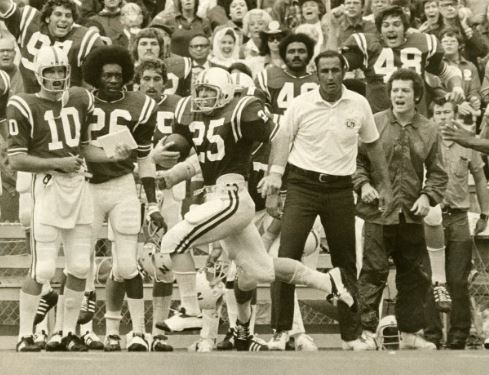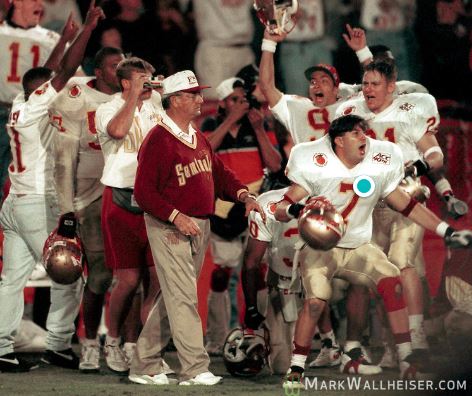Anatomy of an Era: Lance Gray, Part 3

Excerpted from Chapter 67, No Place Like Nebraska: Anatomy of an Era, Vol. 2 by Paul Koch
Anatomy of an Era: Lance Gray, Part 3
Q: So bring us into present day. What have you taken from being in the Nebraska Football system? What are the greatest benefits from that experience?
Lance Gray: The most important thing I got from being in that system? It was designed where you had the leadership of the coaches and then you had the discipline you had to have as a player, the commitment, the alignment with the program. That model fits in every organization, every business, every relationship to be successful. If you have the vision, the discipline, the commitment, the follow-through to make it happen… that’s something I see lacking these days.
I’m in urban Phoenix, an inner-city environment, and have been here for 10-12 years, and that’s something I got from athletics. I have discipline, commitment, vision, and few have the benefit of going through a structured program like that. We were told when to wake up, told when to go to school, we were told when to work out, told when to practice, told when to go to bed. And some people make a tough transition out of that, “What do I do now?” But if you take those leadership values that were given to us (and back then we didn’t know what they were, we didn’t know they were leadership values), we were just, “These dicks are always telling us what to do.” (laughs) But they were instilled in us, the leadership values, that as we move on and up in society, some are running their own businesses, some are in the local government or whatever, those leadership values stay with you.
And you can reflect on them, recall them in the worst situations in life and the funny feeling in your stomach and say, ‘We were down 18-16 in the Orange Bowl and we came back from that and almost won. So, how bad can this be?’ It just gave you a baseline of what intensity really is. Unless you handle a lot of that stuff with a little more emotional intelligence, you realize that you’ve been tested and you can handle anything and you can make it through whatever it is you’re fighting.
And we didn’t know when we were youngsters -I wish I knew when they took us through those high schools and those middle schools- the impact I could have had on those kids. I wish I would have looked them in the eye and told them a few things and tried to help them, but we were always funny, instead. We could have changed their lives, and that’s what I’m doing now at the Tempe YMCA. I spend my whole life trying to help them realize their potential and allow them to learn what I learned out there at Nebraska.
Q: Kind of like Coach Osborne’s TeamMates mentoring program?
LG: Yeah, and we were out there, we were in the schools and we did things like ‘The blood, the sweat and the tears.’ I was always ‘the blood’ and you had the sweat and the tears. Some of the better athletes, they were the sweat and the tears, but we talked to kids, and it seems had we really known what the hell we were doing we could have had a bigger impact on a lot of people. And you look back now and you’re, ‘Wow, they were instilling leadership values in us and we didn’t even know it.’
Q: A subliminal course in leadership, perhaps?
LG: Yes!

Calvin Jones #44
Q: That’s funny. And you’re not the first guy to use the term ‘blood, sweat and tears.’ Was that a presentation you guys would always give?
LG: No, it wasn’t. But some of the younger coaches, the GA’s, they would take guys like myself, Calvin Jones and one of the DB’s, they would introduce us as the heart, the soul, you know, the blood, the sweat and the tears. I was the no-nonsense, hit-you-in-the-mouth, hit-you-in-the-face guy, and Calvin was the sweat, the running back, making the effort to get the yards for us. And then you had the tears, the guy who makes everybody else cry when he hit the opponent and made them look bad. (laughs) It was just an analogy they used. If we knew then what we know now, I think we could have changed the world.
Q: But it’s never too late to start, right?
LG: No, that’s the way I see it. I have all these memories and all these things I talk about and I see the same stubborn, pig-headed, I-know-what’s-best-and-I’m-just-gonna-do-my-thing kids, and I’m trying to work on different levels of personality with them. There’s a way to reach them, but I can’t reach them all with my personality. I have to figure out where they’re coming from. That’s the gift that I got, which was really what they were doing at Nebraska. They were trying. They were a class act and they wanted everyone to be a class act. That was Osborne’s gift to take a bunch of yahoos like we were and make us into a class act.
Q: That was tough work. (laughs)
LG: Well, they went from good to becoming effective to becoming great.
Q: So let me ask you, Lance, was there any one person behind the scenes who you feel made a huge difference in the organization? Some integral cog?
LG: Did anyone ever mention Jack Pierce? Jack was one of the alumni guys and he was also networked with some of the recruiting and stuff like that. He really was an integral part. And I’m trying to remember who the hell was the crazy fullback? … A long time ago, Like Dean Steinkuhler era or earlier.
Q: Mark Schellen, Tom Rathman, Doug Wilkening…
LG: Earlier…
Q: Tony Davis?
LG: Yes, that’s it! Here was a guy who would come and show up -and I don’t know if you even want to print this- but he would come and talk to guys off-the-record, without Osborne even knowing it, or anybody knowing, I think. But he would show up at the dorms, or the parties and point a few things out and say, “This is it, boy, you’re in the big show now. You could do this, this and this. You can go out and do this, this and that. You can go out with the girls and get into the booze and the drugs… but don’t do it. You’re in the big show now. You can have the greatest time in your life, just play the game and have fun.” And you know the story behind him, I’m sure, but he was one of those guys who would just show up out of the blue.
Q: Interesting. ’Tough Tony’ from Tecumseh, Nebraska…
LG: Yes, Tony Davis, Jack Pierce. And then there was that big guy who played down in Kansas City, who would just show up unannounced, too?

Tony Davis #25
Q: Neil Smith?
LG: Yeah! Neil Smith.
Q: Neil would show up with his Mercedes Benz with the gold-plated windshield wipers and diamond-studded Rolex watch…
LG: Uh huh, and one other guy who had a huge impact in my life, a linebacker, he was related to Tyler Zahn, he played for the Broncos… Marc Munford. Munford was the spine behind us when we were there. He knew Tyler Zahn. He would come up and give us a pep talk. He was a great guy, too.
Q: Interesting how some of the former players would support and encourage and urge you guys on and keep you on the path…
LG: You know, we were struggling. We always won the Big 8, won it every year, but we couldn’t win the bowl game. And they were trying to identify the breakdown. ”Where is the breakdown?” And I think they were reaching out to some of those guys to come up and get an idea of what the deal was. ”We’ve got all this talent, we’ve got all this stuff in place, but where’s the breakdown?” And I think a result of that was where the unity theme started coming along.
It is a standard model in leadership: until you have breakdown you can’t have a breakthrough. That’s what happened when we went from good to great, after we lost that Florida State game they identified the breakdown, and boom, we’re through. National Championships after that.
Q: So tell me, is there anything else I haven’t touched on about that ‘Unity, Belief, Respect’ that made the difference between ’89 when you arrived and ’93 when you left?
LG: I had the same run of coaches, the same philosophy there. I think it’s not the most important thing, but they found a way for everybody to utilize their talents. I don’t mean that people were in the wrong position… or maybe they were in the wrong position, but somehow they were able to identify where guys fit into the whole scheme. One of the biggest ones was the switch from the 5-2 to the 4-3. And all of a sudden they bring in guys like Wistrom -and Trev Alberts was one of the first guys to really play a part in that.
Q: Those are Tony Samuel’s guys, again. The ‘difference makers’ …
LG: Yes, and there would be the guy who ran the hundred in 10 seconds. He would say, “That’s the guy who’s gonna play outside linebacker for me.” And I’m, ‘This guy’s like 6’5” and 210 lbs.’ And he was like, “You just watch and see.” And that’s what he did. Speed kills. And I don’t think I answered your question correctly, but whatever wasn’t gelling there, all of a sudden it gelled.
And you touched on it earlier, but the most important thing that happened after that loss to Florida State was ‘desire.’ We had a meeting where the team would get the occasional, “There’s no drinking during the week. No partying on the weekends.’ People were on-board and off-board, but I think that next season the desire took over. The discipline on that team took over because of that desire. And Schlesinger was still there and Chris Norris was still there that next year after I’d left, and I came back a few times that year. The desire to win fueled the commitment, which fueled the discipline and took them to that next level. That’s probably the best insight I have, looking at it these 15 years later.

And being hungry by yourself wasn’t going to work, they all had the discipline to follow Boyd Epley’s rules, to do all the strength training, do all the spring practice, get into class at 7 a.m. so you’re in practice at 2 in the afternoon. All that stuff has to come together in one way or another, and I think that was the unity starting with everyone thinking the same. And then losing that game; the desire, the discipline and commitment really came together. I wish I’d had one more year. I watched that game and I was just elated for everyone.
Q: It was like you were still with the team, just not in a physical sense?
LG: Yes. It was amazing.
Q: And hey, I want to buzz something off you, Lance. Do you think having Kenny Walker on the team, other than his playing, did his being there do anything else for the rest of the team?
LG: Oh yeah, he made a difference. He was only there my freshman and sophomore year, and I think when Mike Croel went to the Broncos he said to them, “You guys are idiots if you don’t take this guy.” And I think after that happened, the guys realized, “Holy shit! It doesn’t matter. This guy was that good that he’s now in the NFL.” We’d do the signals with him, when they did the audibles you’d pat him twice on the left, pat him twice on the right, pat him on the butt, he was always in the right spot.
And I don’t know if that exactly answers your question, but he was a physical specimen, he was a marvelous human being, he was nice to everybody. And to see him make that transition, he was an inspiration to everyone because he was able to do what we all wanted to do as kids: play pro football. And here he has a limitation and he didn’t leave anything behind. He went full speed all the time. And the rule was McBride’s, and it was, “Mistakes at full speed are okay.” Mistakes at full speed were his rule, they were okay. He was an inspiration. And the four years prior to me, he could have impacted a lot of other players, too. Even the older guys, the Kent Wells’, the Mike Murrays’ who were seniors when I was a freshman.
Q: They were quite a crew, weren’t they?
LG: That was the most insane crew. Coming fresh out of high school seeing those huge guys, full beards, and here we are these 18-year-old kids sitting at the training table. And here you have these guys in long cowboy coats and cowboy hats. A wrecking crew. Remember Mark Hagge out of Omaha, too?
Q: He was a unique personality, wasn’t he?
LG: Exactly. And that’s a testimony to him, because that’s who people would compare me to. He had the same kind of impact. He traveled for four years and played special teams and was an impact player. I never played with the man because he graduated the same year I started, and I didn’t know him at all. But that training table, you’d see that cast of characters and you had that giant specimen of a person in Kenny Walker, and he succeeded despite the limitations of his deafness. It’s so vivid.

Available on Amazon.com
Q: Any other person stand out to you or was unique in what role they played your later years?
LG: You know who was there, was Lawrence Phillips. Talk about an athlete. Ath-lete! I would have given both my arms to have the gift that kid had. I think he was a freshman -and you talk about an amazing athlete?- and he took the ball down the field every time. Parrella was a great impact player, too, in my book. Brenden Stai and Zach Wiegert were phenomenal, and Mike Anderson was a big impact player. There was Doug Colman, too. And me and Kevin Ramaekers ran together for 5 years there in Lincoln, we tore that town apart. (laughs) I run into Brendan Holbein and Toby Wright down here every once in a while, also.
Q: Well, I think we covered all the bases here. But I have to ask you about those kids in inner-city Phoenix, what do you think those kids are lacking? Is it lack of mentors, is it the need for someone to present a vision to them?
LG: When I say ‘lack of vision’, what I mean by that is: they don’t see anything outside of their own four walls. So they’re not doing anything to unleash their potential. Obviously athletically, like when I was growing up, if you want to get out of town you had to play football, baseball or basketball. I think there are probably too many distractions now, as to who is a true leader. Is it the Kanye West or Lil’ Wayne? For us it was the Joe Kleckos, the Mark Gastinaeaus. That’s who the leaders were. We didn’t have all the other distractions like the rappers and all that. But I think it comes down to vision, and some of it might be simply having more opportunities.
Q: I appreciate your sharing, Lance. Hopefully this book will give people a greater understanding and respect for what you and the Nebraska Football organization was able to accomplish there at Nebraska.
LG: I like the way you’re looking at it. Like the Jim Collins book, the two things you find when you looked at the research was, 1) the company made the choice to be great, and 2) the company engaged in vigorous debate to make the changes necessary to be great. And that really mimics what Nebraska did, because that was the goal at Nebraska: to achieve perfection. It’s an awesome parallel.
End conversation.
Lance still ‘gets’ it, and I was heartened to hear how he’s carried the lessons from those college days into the present for the benefit of the young ones under his guidance. Like many former teammates, he had to shake some of the ol’ cobwebs loose in order to bring to remembrance those halcyon wedge-busting days, but when the vault was opened we were blessed with a cascade of spirited enlightenment. I did sense, though, his remorse at mentoring opportunities wasted, his time on the Husker player pedestal poured down the drain, because it’s confounding the influence a Nebraska Footballer can have on the local youth, where just one inspiring speech or a simple autograph encounter can leave a youngster awed and a fire kindled for a lifetime of advancement. Some of the Huskers were still kids themselves, life moving at them faster than a winter wind, and one might come to the conclusion that even though they are often viewed as near infallible and unconquerable from an adoring child’s vantage point, it took them a decent amount of time after the playing days to finally slow down and count the cost of the experience, reaping rewards in the future.
In this talk we heard of numerous one-on-one communications with the coaching staff, both formal and informal. Then there was his, “Every year before every season you sat down with coach and did a one-on-one, and it was a brutally honest communication.” The truth hurts, but it’s still the truth, nonetheless. Third and fourth string must have been so much more a mental exercise in self-restraint, because patience is a virtue sorely lacking in so many young men. They wanted to display their skills in any manner available, yet the coaching staff had to find a way to keep all 150-160 going in the same direction. Notice how Lance was happy to have found his special teams niche, like many, yet still burned and yearned to climb the positional depth charts? These guys were always hungry in that regard, often willing to sacrifice pride, health, life and limb to just ‘get out there on the field’ and ‘do the game justice.’ I’d like to think they did it justice and more.
Another precious tidbit was his mention of the equal time special teams received in the practice routine. Far from being a mere aside, a second tier priority, falling into the realm of mere supplement to the offense and defense, special teams units were gathered up mid-practice – just as they would be in a game- and run through their paces. ”It was just one of those things you took pride in, because it was the easiest way to score points.” And I never much noticed until he mentioned the concept, but Lance was right: Nebraska Cornhuskers very rarely, if ever, ran out of bounds. ”If you caught a kickoff or a punt you ran north and south until you were stopped, you’d never ever see a Nebraska football player run out of bounds.” Though often attributed to Horace Greeley, John B. L. Soule originated the phrase, “Go West, young man, and grow up with the country.” While it’s true they were still growing in maturity, the imperative for special teams would have been, “Go North/South, young man, and score six points for glory.”
Notable quote #2:
Lance Gray on the effect of the ’93 Orange Bowl loss, his final game, on remaining teammates: “The desire to win fueled the commitment, which fueled the discipline and took them to that next level.”
Copyright @ 2013 Thermopylae Press. All Rights Reserved.
Photo Credits : Unknown Original Sources/Updates Welcomed
Author assumes no responsibility for interviewee errors or misstatements of fact.